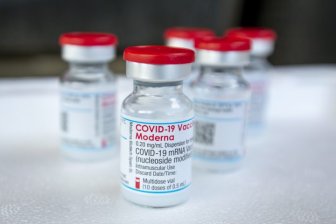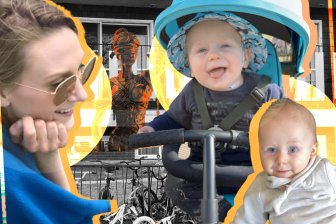Alberta identifies 1st case of Omicron COVID-19 variant in returning traveller
Alberta’s chief medical officer of health said Tuesday that the province has one confirmed case of the Omicron COVID-19 variant of concern.
Dr. Deena Hinshaw said an individual returning from Nigeria and the Netherlands “about one week ago” tested positive for the Omicron variant while asymptomatic.
The individual was not vaccinated, Alberta Health told Global News.
Read more:
Omicron variant: Canada expands travel ban, seeks booster guidance
The individual, who travelled alone, has not left quarantine since they arrived, Hinshaw said.
All household members have been contacted and measures are in place to limit the risk of transmission, Hinshaw added.
“Neither this individual nor their household individuals have done anything wrong.”
Story continues below advertisement

COVID-19: Alberta identifies first case of Omicron variant in returning traveller
When the positive case was detected, full contact tracing and notification was done, PCR testing was offered to all close contacts and rapid testing options were offered to the household as well, Hinshaw said.
While it’s important to remain vigilant, Hinshaw said she doesn’t “want Albertans to be alarmed.
“We anticipated the arrival of this variant in the province… we are well prepared for this eventuality.”
Read more:
Omicron and travel: What new travel restrictions mean for refunds and insurance
Hinshaw said at this time, this is the only confirmed case of Omicron in Alberta.
“Our goal is to the delay the spread of Omicron while we learn more about it.”
Story continues below advertisement
She said the updated testing and quarantine rules for international travellers arriving in Alberta announced Monday are a cautious approach until more is known about this new variant of concern.
“We should not stigmatize countries where a new variant is identified,” Hinshaw stressed.
Anyone arriving from a country outside Canada in the last 14 days who tests positive for COVID-19 is being screened for all variants and will undergo additional follow-up.
Read more:
COVID-19: Alberta announces new steps to prepare for Omicron’s ‘likely’ arrival
Alberta is focusing on a generic approach because there are many countries that don’t have the access or ability to expand vaccine coverage, Hinshaw pointed out.
“Globally, as long as there are countries where the virus could transmit widely if it enters those countries, we’re all at risk. Part of this risk, I think, is about vaccine equity around the world. Part of the risk is about some of those unknowns.
“Until we know more about the virus… I think it’s appropriate to have that high level of caution,” Hinshaw said. “But I do believe, that based on everything we’ve seen prior, that vaccines are likely to provide still some protection against severe outcomes and I believe we have very good infrastructure for detecting this in its early days and slow its spread.”
Story continues below advertisement
She said other reasons for optimism include vaccines being available to children, future expansion of booster eligibility and oral medications being developed to protect against severe outcomes.
“There are lots of reasons to be hopeful,” Hinshaw said.
“I think it’s important that we’re cautious but we also not see this as a reset to ground zero.”

Alberta introduces measures for Omicron coronavirus variant despite no cases
On Monday, Premier Jason Kenney outlined the province’s steps to prepare for the “likely” arrival of Omicron, a new COVID-19 variant of concern.
Trending Stories
-

Moderna CEO says COVID-19 vaccines may be less effective against Omicron variant -

Family seeks answers, change in wake of Hinton murders: ‘Never going to be the same person again’
The Alberta government said it plans to test all COVID-19 cases not identified as Delta cases for the Omicron variant and those efforts will prioritize cases involving travellers.
Kenney added that 156 travellers have arrived in Alberta in the last two weeks from countries of concern with regard to the new variant and all have been reached out to in an effort to quickly address any potential new COVID-19 cases.
Story continues below advertisement
The government said anyone returning to Alberta from an international destination who tests positive for COVID-19 will be subject to a more extensive case investigation and heightened contract tracing efforts. PCR tests will be recommended for close contacts and household contacts.
Read more:
Canada finds first cases of Omicron COVID-19 variant in Ontario. Here’s what we know
NDP health critic David Shepherd said Tuesday while he is pleased to hear just one case of the Omicron variant has been confirmed so far, the timing of the case is particularly concerning given it comes just weeks ahead of the holiday season.
“Families are making plans to travel and to gather, businesses are making plans to bring in seasonal staff and inventory, and this news does unfortunately put all of these plans into some doubt.”
On Monday, the NDP proposed two measures it says will help the province put together an effective response to the variant of concern.
“First, Alberta needs an independent science team,” Shepherd said. “Critical decisions will have to be made and they must be underpinned by high levels of public trust. And Jason Kenney does not have that trust.”
The Opposition health critic called on the province to be more transparent in its response.
Story continues below advertisement
“We need to see the modelling, we need to see the advice, we need to see the recommendations.”
Shepherd said the province also needs to create a risk index.
“That is simply a description of conditions that would trigger changes in public health measures. That is a critical planning resources for families, school and for small businesses.”
Shepherd also reiterated earlier calls for the UCP to take further steps to control the spread, including in-school vaccination clinics, fully staffed contact tracing for schools and daycares, as well as paid sick leave so people can stay home when ill.
“I know all Albertans are hoping that Omicron does not cause the same level of disruption as previous variants and I certainly hope so too.”
Read more:
B.C. reports its first case of COVID-19 Omicron variant
Kenney, Hinshaw and Health Minister Jason Copping all said the most effective way for Albertans to protect themselves and others against the Omicron variant is to get vaccinated against COVID-19.
Kenney noted vaccines have proven to be effective against different variants, even if the medical community is still learning about Omicron.

Alberta prepares for inevitable arrival of Omicron COVID-19 variant
Kenney said the Alberta government hopes to have more news on a “significant expansion” of the group eligible for COVID-19 booster shots “soon.”
Story continues below advertisement
Currently, a third dose is available to select groups of Albertans who are immunocompromised, 70 years and older, First Nations, Metis and Inuit Albertans who received their second dose at least six months ago, health-care workers who received their first two doses at certain times and intervals, some travellers, and people who received two doses of AstraZeneca or one dose of Janssen.

Alberta identifies 238 new cases of COVID-19 on Tuesday
Daily COVID-19 numbers
On Tuesday, Alberta Health said 238 new COVID-19 cases had been identified over the last 24 hours out of about 5,400 tests.
The province’s positivity rate was at 4.5 per cent.
There were 434 Albertans in hospital with COVID-19, 81 of whom were being treated in ICUs.
Six new deaths were reported to Alberta Health in the last 24 hours.
Story continues below advertisement
— With files from Caley Ramsay, Global News
© 2021 Global News, a division of Corus Entertainment Inc.
Source link : CNN
Leave a Reply Cancel reply
RECOMMENDED NEWS
BROWSE BY CATEGORIES
BROWSE BY TOPICS
POPULAR NEWS
2021 © All rights Reserved ChrisAnu











